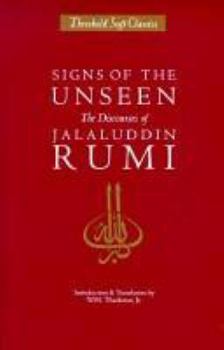Discourses of Rumi
Select Format
Select Condition 
Book Overview
Signs of the Unseen is a collection of Rumi's lectures, discourses, conversations, and comments on various and sundry topics. Even in conversation Rumi expresses his spiritual insights in a style rich... This description may be from another edition of this product.
Format:Paperback
Language:English
ISBN:0939660342
ISBN13:9780939660346
Release Date:January 1993
Publisher:Threshold Books
Length:272 Pages
Weight:0.88 lbs.
Dimensions:0.9" x 5.5" x 8.7"
Customer Reviews
4 ratings
Man is the Astrolabe of God
Published by Thriftbooks.com User , 16 years ago
In Arabic this book was known as "Fîhî ma Fîhî", which means, unhelpfully, "In It What Is In It". It consists of conversations between the great Sufi and those who came to see him, recorded by his followers. Any subject can and does come up, and the Master's associations of ideas are subtle and far-reaching. Just as he could improvise sublime lyric poetry when the mood struck him, here he creates profound spiritual teachings out of chance remarks and faint suggestions. If you're familiar with Rumi and want to go beyond occasional delight and inspiration in his poetry, to learn more about him and his teachings, this may be the easiest point of entry. It catches Rumi off-guard, or rather shows he was never off-guard: it's the next best thing to having home movies of him. I have known and loved the A.J. Arberry translation for years. Arberry was the greatest English Islamic scholar of his generation, I have nearly all his books, and if his grave were within 1000 kilometres I would place anemones on it regularly... BUT... I must confess that when translating from Arabic or Persian, he felt compelled to use an odd old-fashioned English of no time or place, an invention of his own. I got accustomed to phrases like "Mannikin, God exists of a certainty" or "Whatsoever thou soughtest". I will miss them, to be honest. But for 99% of the population, a translation into idiomatic modern English will be an unmixed blessing. Don't be put off by the way Rumi seems to drift from topic to topic or suddenly leap off in some entirely unexpected direction. This is not a mistake; he was not getting confused in his old age. He was wide awake and he wants to keep you awake.
A Noble Effort
Published by Thriftbooks.com User , 23 years ago
Professor Thackston has done admirably with this translation of "Fihi ma fihi." Especially since, in my opinion, this is the hardest of Rumi's works to translate.In his poetry, Rumi is sublime, and accordingly difficult to translate, but any translator can only do so much with a poem. If you miss some nuances, it's just the tradeoff that the translator of poetry must make. The "Masnavi", on the other hand, is a lengthy work, but it has a coherence that makes the translator's life relatively easy and compels the reader on."Fihi ma fihi", however, very often seems to ramble off in a thousand directions. Indeed, sometimes it's hard to escape the feeling that this book was Rumi's attic, all full of jumbled odds and ends, many of them beautiful, but not necessarily in any coherent order. In fact, however, a second reading can reveal that the book is a great deal more than that. If you have been under the impression that Rumi is a sort of Omar Khayyam for the New Age, this book can convince you that just possibly he belongs in company with Shakespeare, Goethe and Pushkin.This translation is eminently readable and even prods the reader on. Professor Thackston has certainly succeeded in translating Rumi's infallible knack to make us look at the world through different eyes. The one sacrifice was Rumi's elegant rhetoric, which just can't be translated. For that you'll have to learn Farsi. In the meantime, this book is to be enjoyed.
Rumi - The Greatest Poet of the "intoxicated" Sufi School
Published by Thriftbooks.com User , 23 years ago
It is the translation of Fihi Ma Fihi, which is full of Rumi's discourses. It sort of dispells all notions of "sufism vs islam" rather sufism is Islamic Mysticism in the truest sense and Rumi explains why the outter conformity to the Sharia (Sacred Law)is very important (i.e. the religous dispensations that are given to mankind through the last of the revalatory Porphet, according to Islam; Prophet Muhammed saws). He himself was a Hanafi (one of the four schools of law within the Orthodox Islam).The book really clarifies his thoughts and ideas behind the poems. Lot of western readers of his poems tend to use his semantics and syntex to project their own meaning to it rather than discover the deep insights and the Reality he is trying to point toward. "I am the servant of the Qur'an While I am still alive.I am the dust on the path of Muhammad, the Chosen One."(Mevlana Jelaluddin Rumi) http://www.jerrahi.org/writings_english/invitation.htm
For the Dreamer of God's Logic
Published by Thriftbooks.com User , 24 years ago
Rumi's discourses are really not so different from his poetry. In each he tries to make the listener (because his style is essentially teacher speaking to apprentice) understand that it is LOGICAL to see how much God loves each person. Because it is more difficult for the rest of us to see what is obvious to those so touched with delight by the intimate presence of God, he uses emotions to convey what to him is the logic. He thus uses poetic language to convey the message, since we find it easier to "understand" an emotive content. Much as Christ spoke in what must have seemed to many impossibly hard-to-understand metaphors, Rumi's discourses do often require an extraordinary "letting go" to sense the logic in his argument. An important work for all the ages.






